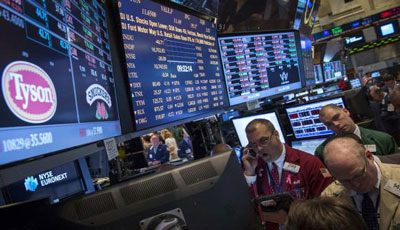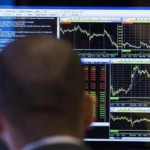An early review of the main moves in markets: Yen advanced, U.S. equity futures fell

Asian stocks fluctuated and U.S. equity futures fell as investors weighed the damage from Tropical Storm Harvey on U.S. oil refining centers. The greenback maintained losses after Federal Reserve Chair Janet Yellen failed to provide clues on monetary-policy tightening.
Benchmarks in Tokyo swung between gains and losses, while they dropped in Seoul and Sydney with S&P 500 Index futures. Gasoline futures jumped as the wider impact of the storm that shut more than 10 percent of U.S. fuel-making capacity was becoming more evident. The euro traded near the highest since 2015 after European Central Bank President Mario Draghi refrained from talking down the common currency at Jackson Hole.
With the much-anticipated central-bank meeting now behind them, investors this week will be eager for signs of constructive progress in U.S. politics after comments on Friday from Gary Cohn, director of the National Economic Council, cut through much of the gloom that had been generated by recent White House scuffles. Cohn said in an interview he expects tax reform to pass this year and that he didn’t intend to resign over the president’s reaction to riots in Virginia.
Treasury traders face a week headlined by Tuesday’s auction of bills that mature Sept. 29 — the deadline Treasury Secretary Steven Mnuchin has called critical for raising the debt ceiling. They will then look forward to inflation and payrolls data that will be key for determining the Fed’s next moves. Federal Reserve Bank of Cleveland President Loretta Mester urged her colleagues to look past recent weak inflation data and to stick to their gradual pace of lifting interest rates.
Also at the Jackson Hole symposium on Friday, Bank of Japan Governor Haruhiko Kuroda said the recent pace of growth in the world’s third-largest economy is probably unsustainable and pledged to continue with very accommodative monetary policy “for some time” because the BOJ is far from its inflation target.
On the geopolitical front, North Korea fired three ballistic missiles over the weekend and Secretary of State Rex Tillerson said on Sunday that the U.S. will continue to push for negotiations to deescalate nuclear tensions on the Korean peninsula despite the “provocative” acts.
Among other key events looming this week:
- The U.S. Treasury issues $132 billion in notes and bills in a 90-minute span Monday.
- The U.K. is due to resumes Brexit talks with the European Union.
- Japan reports jobs data on Tuesday and retail sales figures on Wednesday.
- Hong Kong reports on retail on Tuesday, while Australia is due to publish data on Wednesday detailing construction work done.
- The U.S. updates second-quarter GDP and core price data on Wednesday, and reports on August payrolls on Friday.
Here are the main moves in markets:
Stocks
- Japan’s Topix index rose 0.1 percent as of 2:02 p.m. in Tokyo, while South Korea’s Kospi index fell 0.4 percent. Australia’s S&P/ASX 500 Index declined 0.7 percent. The Hang Seng Index in Hong
- Kong rose 0.6 percent to the highest since May 2015. Some 59 percent of companies on the Hang Seng Index have beaten estimates for semi-annual earnings, according to data compiled by Bloomberg. The Shanghai Composite Index was 1 percent higher.
- S&P 500 futures fell 0.1 percent. The underlying gauge surged to its best week in a month on Friday.
Currencies
- The yen advanced 0.2 percent to 109.14 per dollar, extending gains from Friday.
- The euro was trading at $1.1920 after touching $1.1965, the highest since Jan. 6, 2015.
- The Bloomberg Dollar Spot index was little changed after a 0.7 percent decline on Friday, when it reached the lowest in more than 2 1/2-years.
- The Mexican peso slid 0.1 percent after President Donald Trump tweeted that the U.S. may have to quit Nafta and reiterated his determination to build a wall along his country’s southern border and make Mexico pay for it.
Bonds
- Ten-year Treasury yields rose one basis point to 2.17 percent after falling three basis points on Friday. They are headed for a second straight monthly decline.
- Australia’s 10-year bond yield rose about one basis point to 2.66 percent.
Commodities
- Gasoline futures on Nymex for September delivery soared 5.6 percent to $1.7605 a gallon as of 1:02 p.m. in Singapore. Gasoline is the largest single volume refined product sold in the U.S. and accounts for almost half of national oil consumption.
- West Texas Intermediate crude fell 0.4 percent to $47.70 per barrel. It advanced 0.9 percent on Friday.
- Gold rose 0.2 percent to $1,294.28 an ounce.
Source: Bloomberg – Harvey’s Impact Assessed: Markets Wrap




























